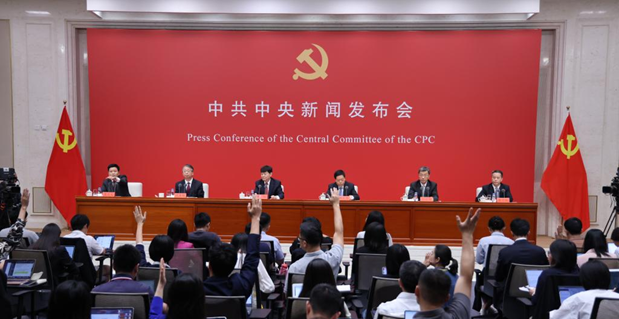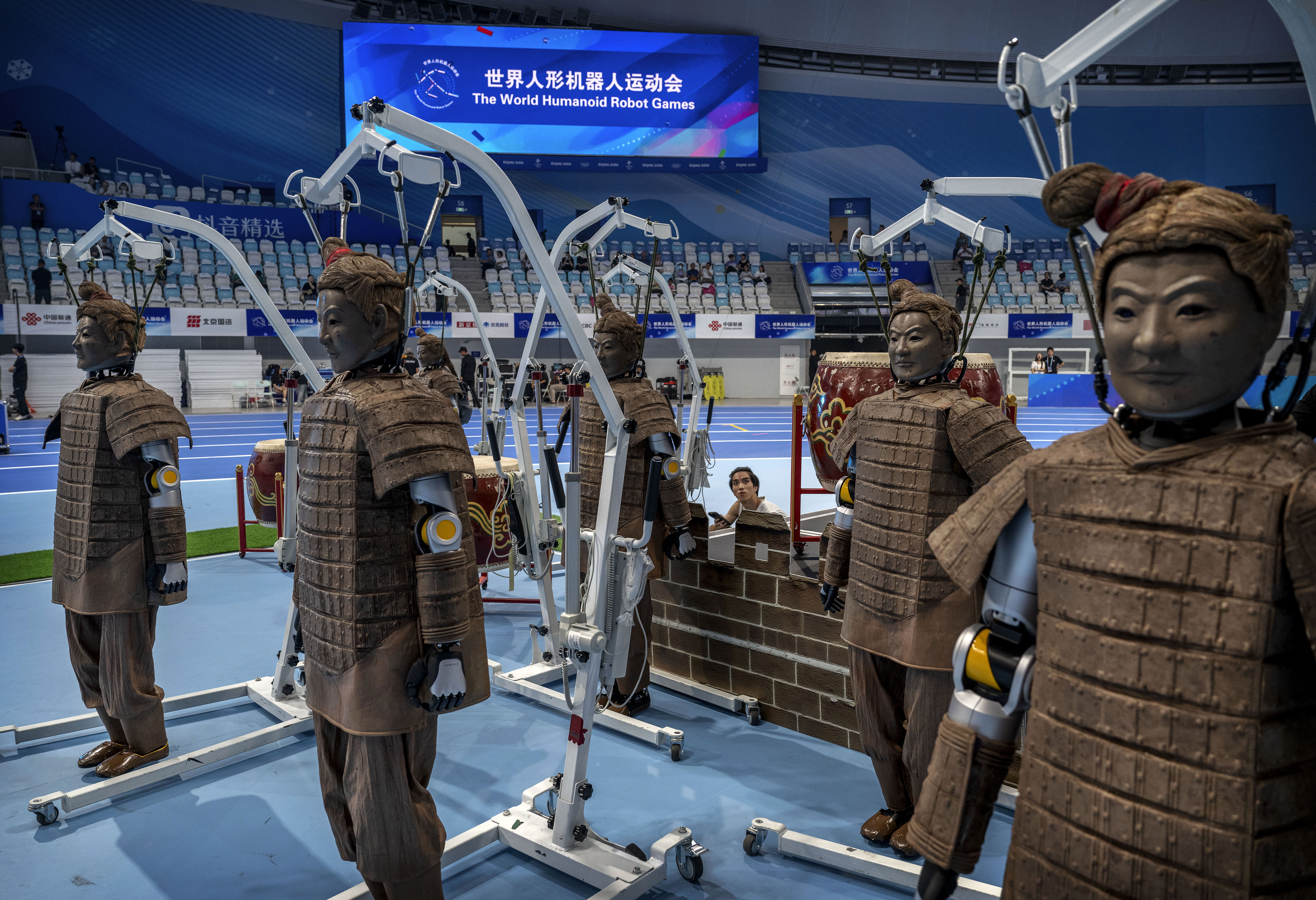
Xi Sets Out 2029 Vision At The Third Plenum
Xi Sets Out 2029 Vision At The Third Plenum
Executive Summary:
- Chinese Communist Party (CCP) General Secretary Xi Jinping has solidified his position as the driving force behind achieving a “high-quality socialist market economy” by 2029. The recent CCP Central Committee Plenum indicated that he would rule until at least 2032.
- The Third Plenary Session of the 20th Central Committee of the CCP outlined its economic strategy, focusing on high-tech innovation. Despite ongoing efforts to revitalize the economy in this vein, growth remains sluggish.
- Discussions of tax reforms could upset business confidence, as the potential broadening of tax categories comes at a time when many companies are facing audits by local governments meant to force them to pay back years’ worth of taxes.
- The plenum hinted at adopting a policy of re-collectivization to address the underutilization of rural land and draw young workers back to agriculture, echoing failed Maoist policies.
- The plenum communiqué stressed the need for controlled pro-market reforms and other measures to attract foreign investment, while acknowledging the myriad internal and external risks the system currently faces.
Chinese Communist Party (CCP) General-Secretary President Xi Jinping has consolidated his status as the anchor of efforts to attain a “high-standard socialist market economy in all respects (全面建成高水平社会主义市场经济体制)” by the year 2029 (People’s Daily, July 19; Xinhua, July 18).The enshrining of 2029 as the target for achieving these goals suggests that the Third Plenary Session of the CCP’s 20th Central Committee, which concluded on Thursday, July 18, has confirmed Xi Jinping Thought as the guiding light of the Party and nation. Likewise, the plenum guaranteed that the 71-year-old paramount leader will remain in power as CCP General Secretary and commander-in-chief for a fourth five-year term from 2027 to 2032 (Deutche Welle Chinese, July 19; rfi, July 18). Meanwhile, a thorough-going purge is being undertaken in both civilian and military sectors. While recent rumors that Xi’s wife Peng Liyuan (彭丽媛)—recently made a member of the disciplinary and assessment office of the Central Military Commission—would be elevated to the Politburo failed to materialize, the commander-in-chief’s hold over the top brass still seems to be as strong as ever (China Brief, May 24).
A Xinhua piece eulogizing “master reformer Xi Jinping (改革家习近平)” was mysteriously pulled from official media on the eve of the conclave. Beyond this, however, no voices challenging Xi’s position have been heard from rival cliques such as the Shanghai Gang, the Communist Youth League, or so-called second-generation “princelings” (rfi, July 20; CDT, July 18; rfa, July 17). Yet apparently due to Xi’s desire to appease all Party factions, the authorities have used careful and somewhat neutral language to describe his call for “high-quality development” and deepening “reform and opening up.” The relatively uncontroversial measures prescribed by the plenum and other Party and government organs seem unlikely to reinvigorate the PRC economy, which grew a disappointing 4.7 percent in the second quarter of this year (VOA, July 20, BBC Chinese, July 16).
Three Key Themes
High-Tech Innovation In Focus
The Xi leadership has lavished billions of US dollars on advanced technologies and high-tech manufacturing in a calculated bid to try to seize the commanding heights of what it sees as a new industrial revolution. This effort has gained urgency following the imposition of export controls on the transfer of technological components to the PRC and attempts to cut the PRC out of the global supply chains for certain goods. These include electric vehicles (EVs), lithium-ion batteries, photovoltaic cell components, and telecoms equipment, among others, that the PRC is already successfully exporting to countries outside of the US-led Western Alliance. According to forecasts by Bloomberg, technology industries could account for 23 percent of the country’s GDP by 2026, more than enough to fill the void from the ailing real estate sector, which is set to shrink from 24 percent to 16 percent over the next two years (Bloomberg, July 16).
Local administrations are being encouraged to be more innovative, in addition to deploying central government spending. For example, cities such as Chongqing and Guangzhou have already approved autonomous rideshare vehicles for certain districts within their municipalities (WSJ Chinese, July 20; Xinhua, June 15; Nanfang Daily, March 8). The success of this initiative depends on three factors: the extent of further tariffs that are to be levied by the United States and the European Union on these imports, the PRC’s capacity to manufacture components indigenously for leading auto industry firms, and whether it can solve the worsening unemployment problem. As PRC-based analysts have noted, “the employment-absorbing capacity of science and technology industries is lower than traditional labour-intensive industries, leading to employment pressures (科技产业吸纳就业能力低于传统劳动密集型产业导致就业存在压力)” (Gelonghui, July 11).
Taxation Reforms
The plenum communiqué only mentions tax reform very briefly. However, official and unofficial media have hinted at a potential broadening of tax categories, especially for consumption or sales taxes. Sales tax collected will be distributed between the central coffers and local governments, but with the larger share going to the latter. This is to relieve fiscal difficulties, namely, the massive debts amounting to some 100 trillion renminbi ($13.8 trillion) accumulated by provincial, city, and county governments, as well as the firms that they support (WSJ Chinese, July 10; Caixin, July 9). Leveraging consumption taxes, however, may be counterproductive, impacting already weak consumer spending.
Changes in the tax system for privately owned firms cannot come quickly enough. Many such enterprises have recently been compelled to pay off taxes and late fees dating back several years, with one firm forced to pay thirty years’ worth of backdated taxes following an audit. These measures are bein implemented by money-starved local administrations as a creative way to recoup funds. As with long-standing practice, the precise level of taxes are negotiated between firms and tax collectors. What is different now is the involvement of the police, cooperating with the tax authorities to extract the levies (“警税合作”). Authorities have denied that this is taking place. Nevertheless, this dampens the prospect for the development of private firms (BBC Chinese, June 24; Global Times, June 18; RFA, June 18).
Re-Collectivization of Rural Land
The plenum communiqué contains one mention of “deepening reform of the land system (深化土地制度改革).” Over the past few months, PRC observers have discussed the possibility of a new regulation on the “reorganization of land plots.” This refers to pieces of rural land left fallow due to a lack of farmers, millions of whom have flocked to the cities to find work in factories. Xi appears to be contemplating some degree of land recollectivization. This would not support the high-tech economy that Xi is focused on, but it could be construed as a magic bullet, boosting agriculture’s contribution to the economy while simultaneously mitigating the unemployment problem by mobilizing more young men and women in the cities to return home to work in the agricultural sector (VOA, July 13; CCTV, July 10). Collectivizing the masses into “people’s communes” was a core tenet of Mao Zedong’s policies in the late 1950s and early 1960s for revolutionizing agriculture, reshaping the PRC’s social base, and achieving his own modernization goals. While these policies have a troubled legacy in the PRC, Xi is expected to go ahead with a less ambitious land reorganization program, though the exact form it will take is yet to be articulated.
Pro-Market Reforms Sit Uneasily With Foreign Policy Objectives
Economic policy is frequently at the forefront at third plenums. Last week’s meeting was no different, with the Central Committee endorsing more effective policies to push pro-market reforms. The caveat, however, is that while these policies would be “energetic and open-minded (放得活),” they must also be “subject to control (管得住).” The communiqué endorsed earmarking more resources for state-owned enterprises (SOEs), but the Central Committee also noted that the non-public economy should be given fair and equal treatment under the law.
The communiqué also evinced a desire to lure back Western multinationals that have pulled out of the country for geopolitical reasons. The document contained no recommendations beyond saying that the PRC would “expand systematic opening up, deepen the reform of the trading sector, and go deeper in the reform of the management system for foreign firms investing in the PRC and PRC firms investing overseas.” Given the likelihood that current or subsequent US administrations will tighen technological and trade sanctions on the PRC and Russia, implementing successful policies in this regard will be difficult. Many firms are either leaving the PRC or diversifying parts of their operations to countries such as Thailand, Vietnam, the Philippines, and India. The United States and several EU countries are also adopting a “reshoring” strategy, asking tech firms to boost their manufacturing capacities at home in sectors ranging from steel and commodities to artificial intelligence (AI) (Bloomberg, June 21; VOA, March 22).
The communiqué read-out has little to say about foreign policy. This is unsurprising for a third plenum. Nevertheless, the Central Committee emphasized Xi’s rhetorical innovations in this domain, including “building a community of common destiny,” the global security, civilization, and development initiatives, and creating an “equal and orderly multipolar world.” This indicates that Xi’s long-standing desire to flex the PRC’s hard and soft power will continue, even though this will likely further deepen geopolitical conflict and reduce the likelihood of retaining foreign investments.
The plenum communiqué suggests that the Xi team seems eager to avoid using provocative and fiery language about Taiwan, though “work against Taiwan (对台工作)” does get a mention in the first paragraph after the preamble. The CCP leadership has left it beyond doubt that the task of national reunification cannot be shirked, however. It is also possible that the absorption of Taiwan could be tied to the accomplishment of the goal of “high-quality socialist modernization” to be achieved by 2029, when Xi Jinping is expected to be still at the helm of the Party and state apparatus. The two phrases were linked for the first time in this plenum’s communiqué.
Xi’s leitmotif at the plenum was to further enforce loyalty. All civilian and military cadres must profess unchallenged fealty to the “leadership core.” Moreover, all policies enacted by the Center and the localities must have Xi’s personal approval. Xi’s particular emphasis on the “absolute leadership exercised by the Party over the PLA (党对人民军队的绝对领导)” was notable, given the ongoing purge of military officers, especially those in the PLA Rocket Force. Following the dismissal of former defense minister General Li Shangfu (李尚福) from the Central Committee for “serious disciplinary offences (严重违纪违法问题),” Xi is expected to fill more high-level slots with officers that meet his much-tougher criteria on loyalty.
Conclusion
Xi’s position continues to appear unassailable within the Party. Indications in the plenum communiqué suggest, however, that the PRC remains in a precarious position. The external situation is characterized as “serious and complex (严峻复杂),” while the task of stable reform and development at home is viewed as “formidable and strenuous (艰巨繁重).” Moreover, the personnel changes at the end of the document underscore how the Party’s perennial bêtes noires of “formalism and bureaucracy (形式主义、官僚主义)” still need to be overcome. If Xi’s proposed reforms for the economy do not have the desired effects, and the deep structural issues are not resolved, the balance of power within the Party could finally start to shift. For now, however, Xi remains the undisputed core of the Party and of the country.


